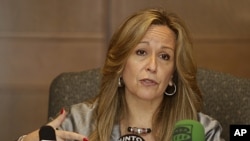Nations backing military action in Libya have finalized a monetary fund to assist the country’s opposition and pledged more than one billion dollars to the rebels' cause. At a meeting in Abu Dhabi, members of the Libya Contact Group also said that their attention is now focused on preparing the North African nation for a post-Moammar Gadhafi era.
Speaking at the end of Thursday's meeting, UAE Foreign Minister Sheikh Abdullah bin Zayed al-Nahyan assured that the financial mechanism agreed to would satisfy the needs of the Transitional National Council, the political body formed to represent Libya’s anti-government rebels.
The total amount of aid on offer is still to be tallied. But on Thursday nations pledged more than one billion dollars. Officials previously agreed to set up the temporary fund during talks in Rome last month.
U.S. Secretary of State Hillary Clinton says there is now consensus that the rebel council is ready to handle the support.
"There was a lot of work done led by the Qataris, the Emiratis and the Kuwaitis and many of the rest of us to establish this mechanism with sufficient transparency and accountability because the last thing we want is to put the TNC in a position where the money flows, but they don’t have the systems in place to put it to good use. We think that they do now and we’re working to assist them," she said.
Officials have stipulated that the money on offer is meant to cover “necessary” costs like salaries and food supplies and not be used for weapons purchases.
NATO this week extended its air operation in Libya for another 90 days and intensified its bombing in the capital, Tripoli. Mr. Gadhafi said he would remain in his country “dead or alive.”
But officials meeting in Abu Dhabi, including Australia’s Foreign Minister Kevin Rudd, believe the defiant leader is rapidly losing legitimacy.
"The overall conclusion of this conference is that the days of Gadhafi are coming to an end and that they are coming potentially to a rapid end and therefore the challenge of the international community is to prepare for a post-Gadhafi Libya," he said.
Rudd said the Libya Contact Group is now focusing on building an interim administration to govern Libya after Mr. Gadhafi’s exit. He also brought attention to the humanitarian situation, saying more needs to be done to ensure that Libyans affected by war have food, shelter and medical aid.
Latest reports say nearly one-sixth of Libyan nationals have been displaced by the conflict.
World Powers Agree on Aid Package for Libyan Rebels




